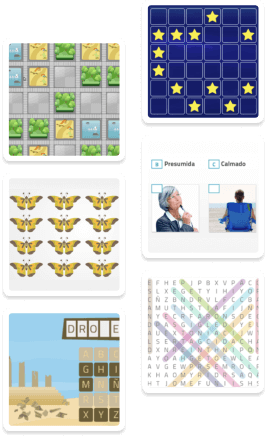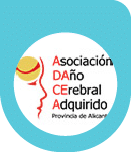
Use Cases
Neurodevelopmental Disorders
Boost the child’s abilities with activities developed to compensate
the deficits linked to each disorder.
In which conditions can we apply NeuronUP?
Some activities for
children with neurodevelopmental disorders

Step
by Step
With this sequencing exercise, in which the child must divide daily activities into steps, we work on planning, comprehension and reasoning.
It adapts to the needs of each intervention:
- Organized in different levels of difficulty.
- Possibility of working on the activity with texts or images.
- Available in digital or paper format.
Pack
your Backpack
In this game the child must put in the backpack only the elements he/she will need for the subjects scheduled for that day, thus working on his/her planning, selective attention and education skills.
- Game divided into stages.
- The level adapts automatically depending on the successes and mistakes made.


What do they Think?
Activity focused on social cognition, in which the patient works on first-order false belief tasks.
- Digital worksheet format.
- 15 worksheets available.
- Medium level.

Discover 10,000 more exercises on our platform
Validate your intervention
Constantly updated data
Monitor the patient’s progress and keep parents informed about their child’s evolution with graphs focused on specific exercises or on the overall intervention, from the beginning until today.

On what basis
do we develop our exercises?
We identify the constructs, operations and functions (Burgess et al., 2006) involved in human activity, in order to create exercises capable of being calibrated during the rehabilitation process.
Burgess, P. W., Alderman, N., Forbes, C., Costello, A., M-A.coates, L., Dawson, D. R., … Channon, S. (2006). The case for the development and use of measures of executive function in experimental and clinical neuropsychology.Journal of the International Neuropsychological Society, 12(02), 194- 209.
The aim is to create motivational and customizable ecological contents that support the neuropsychological stimulation and rehabilitation processes (Wilson, 1987; 1989).
Wilson, B. (1987). Single-Case Experimental Designs in Neuropsychological Rehabilitation. Journal of Clinical and Experimental Neuropsychology, 9(5), 527-544. doi:10.1080/01688638708410767
Related studies
Neurodevelopmental Disorders
ADHD
Steiner, N. J., Sheldrick, R. C., Gotthelf, D., & Perrin, E. C. (2011). Computer-Based attention Training in the Schools for Children With attention Deficit/Hyperactivity Disorder: A Preliminary Trial. Clinical Pediatrics, 50(7), 615-622. doi:10.1177/0009922810397887
Learning Disabilities
Seo, Y.-J., & Bryant, D. P. (2009). Analysis of studies of the effects of computer-assisted instruction on the mathematics performance of students with learning disabilities. Computers & Education, 53(3), 913-928. doi:10.1016/j. compedu.2009.05.002
What our clients say about us

Paula Rodríguez,
neuropsychologist
I have been using NeuronUP for more than two years at the brain injury association and the patients are very happy to work with the platform’s activities.”

Gloria Cano,
neuropsychologist
I think it is a platform that every psychologist and neuropsychologist should have, as it provides you with the necessary material to work on cognitive stimulation in a comfortable and easy way, in person and from home”.

Rocío Mendoza,
neuropsychologist
With NeuronUP, the monitoring of children’s progress is more objective and demonstrable to parents.”
Learn more about
NeuronUP
Try it for free
The platform that 3,500+ professionals use on a daily basis